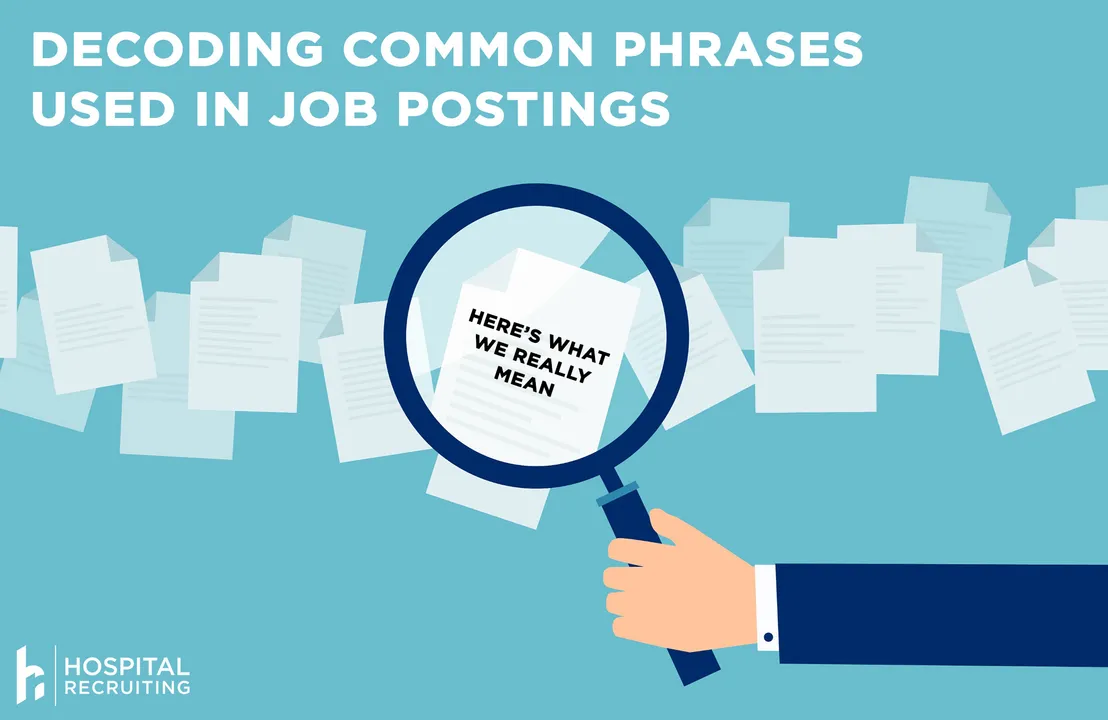Decoding Common Phrases Used in Job Postings

The current job market is flourishing, and candidates are met with a plethora of ads to sift through in their search for positions. With postings ranging from long and overly detailed to short and extremely vague, it can be an exhaustive experience as candidates decide which job matches their experience and desires best. Further complicating the process is the ever-present need to interpret what the ads mean. From generalizations to confusing lingo, it can be quite a process! Let’s look at some common phrases used in job ads and how to decode them.
Experience Preferred
Seeing this simple phrase turns off many applicants who fear that they won’t measure up to others with experience in the position’s field, but don’t be dismayed --- this is actually a wonderful opportunity! When an organization requires a certain level of experience they’ll use the phrase, “Experience REQUIRED.” Experience PREFERRED is an open door for those who might not quite have the experience but have similar or limited experience or are capable and willing to learn. If you catch this phrase on a job posting that interests you, and you’re interested in gaining more experience in the field, go ahead and apply!
Pay Commiserate with Cost of Living
While pay transparency is much more acceptable these days, there are still many organizations that don’t reveal the pay ranges in their job postings. Instead, they’ll use phrases such as “pay commiserate with cost of living.” There are a few things at play here. First, the company is keeping the salary range private. This lets you know from the start that they are not wholly transparent in their pay discussions. You’ll need to prepare yourself for negotiations that will likely start with you providing an opening bid. Make sure that you do your research on what is the acceptable pay range for the position for someone living in your area. Secondly, this could be an indication that the company is on a tight budget. This doesn’t necessarily mean that the job isn’t a great fit, but it likely means that you won’t be starting out at the top of the salary range. Be sure to ask about additional benefits that might sweeten the deal if the pay is just average.
Sign-on Bonus
Sign-on bonuses are a popular selling point these days, drawing in wide-eyed candidates who are looking forward to the income boost. Unfortunately, these bonuses can come with some caveats. First, sign-on bonuses could indicate that the position is difficult to fill and/or difficult to keep filled, leading the organization to offer bonuses in order to get more candidates through the door. With that in mind, ignoring the sign-on bonuses and only apply if you would do so without the bonus is best practice. Secondly, you may find that you’ll need to sign a contract for a certain period of time (often several years…paying the bonus back if you leave prior to that time) or you’ll only receive the bonus after staying for that timeframe. Additionally, many companies break the bonuses into smaller payments that are taxed as supplemental income. That $10,000 sign-on bonus may end up being a $2,500 take home bonus once yearly for the next 4 years. That doesn’t sound quite so exciting, does it? Your best bet with a bonus is to accept it only if you’re truly committed to the position and then use it as additional savings. Never depend on the bonus check as part of your living wage.
Limitless Earning Potential
While we’re talking about pay, let’s discuss this phrase. Limitless earning potential is a sure driver to candidates who are short on cash. In fact, many who read this sort of ad immediately assume that if they work hard, they’ll be rolling in dough. While the phrase is not intentionally misleading, it can offer an inflated sense of hope when it comes to earnings. Productions bonuses can certainly add up significantly in the right job in the right job market, but be sure to ask about required patient volume to hit specific benchmarks.
Occasional
Maybe the most misleading word that is used in job postings, “occasional” should never be taken as such. A subjective concept, “occasional” may mean daily to the employer while candidates could interpret that as meaning those tasks are less frequent. Some postings will sell the more desirable parts of the jobs and throw in an “occasional” at the end. “Occasional weekends,” “occasional on-call coverage,” or “occasional additional tasks” means that those items are on the agenda. For applicants, this means it's important to ask the potential employer to define exactly what they mean by "occasional."
Work at Home/Remote
Work at Home! Remote Position! Hybrid!
With workers finding comfort in working from their home office, headlines including these keywords have become most popular. However, diligence is required when considering this type of position, as the remote portion of the work may not be the bulk of the duties required. Some will require a certain number of days worked at the office, a lengthy trial period done on-site, or patient/facility visits. In fact, some require that the bulk of the day is spent in the field, with some reporting or documentation being done from home upon completion. Another facet to keep in mind is that due to HIPAA, you may be required to meet several requirements that could result in a personal financial investment regarding your office space.
Provide Sample Work
If you’re searching for a creative position, you’ll surely run into at least a few listings that ask you to submit a full, unique version of your craft with your resume. While it shouldn’t be assumed that all employers are trying to take advantage, it is important to protect yourself. A legitimate employer should be willing to accept samples of previously created work rather than ask you to submit a whole new piece. If you offer a sample and the poster declines, insisting that you create a brand-new piece to submit, you may want to do some additional research into the organization. Unfortunately, some less than desirable organizations will use these types of postings to garner free work.
As companies navigate the current worker shortage, they’re doing their best to attract and on-board new team members in a competitive yet fair way. While they often don’t intend to mislead, these phrases have become acceptable lingo that can be confusing for the reader. Protect yourself and apply to the jobs most suited for you by decoding the key phrases used within, and you’ll surely be successful in your search!
Related Posts
